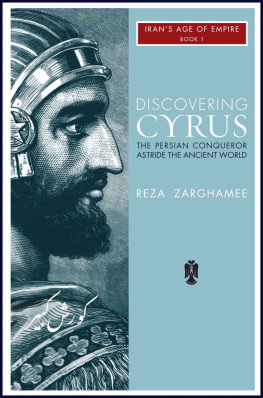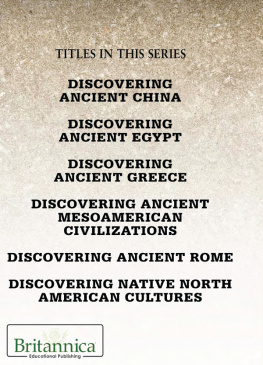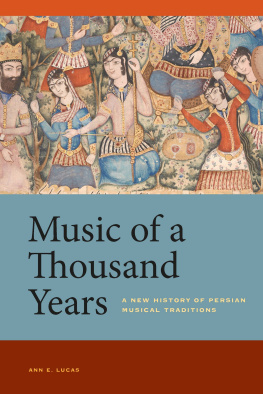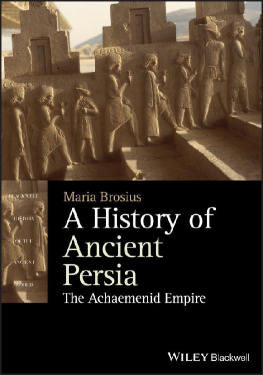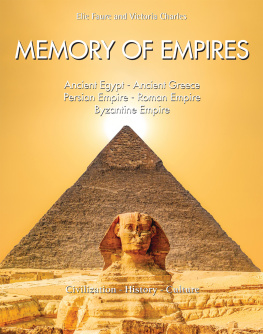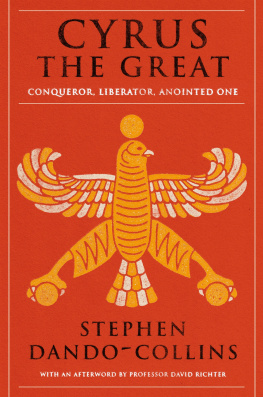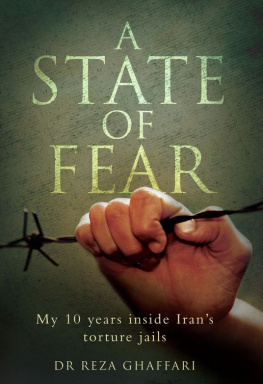Reza Zarghamee - Discovering Cyrus: The Persian Conqueror Astride the Ancient World (Irans Age of Empire Book 1)
Here you can read online Reza Zarghamee - Discovering Cyrus: The Persian Conqueror Astride the Ancient World (Irans Age of Empire Book 1) full text of the book (entire story) in english for free. Download pdf and epub, get meaning, cover and reviews about this ebook. year: 2014, publisher: Mage Publishers, genre: Religion. Description of the work, (preface) as well as reviews are available. Best literature library LitArk.com created for fans of good reading and offers a wide selection of genres:
Romance novel
Science fiction
Adventure
Detective
Science
History
Home and family
Prose
Art
Politics
Computer
Non-fiction
Religion
Business
Children
Humor
Choose a favorite category and find really read worthwhile books. Enjoy immersion in the world of imagination, feel the emotions of the characters or learn something new for yourself, make an fascinating discovery.
- Book:Discovering Cyrus: The Persian Conqueror Astride the Ancient World (Irans Age of Empire Book 1)
- Author:
- Publisher:Mage Publishers
- Genre:
- Year:2014
- Rating:4 / 5
- Favourites:Add to favourites
- Your mark:
- 80
- 1
- 2
- 3
- 4
- 5
Discovering Cyrus: The Persian Conqueror Astride the Ancient World (Irans Age of Empire Book 1): summary, description and annotation
We offer to read an annotation, description, summary or preface (depends on what the author of the book "Discovering Cyrus: The Persian Conqueror Astride the Ancient World (Irans Age of Empire Book 1)" wrote himself). If you haven't found the necessary information about the book — write in the comments, we will try to find it.
Reza Zarghamee: author's other books
Who wrote Discovering Cyrus: The Persian Conqueror Astride the Ancient World (Irans Age of Empire Book 1)? Find out the surname, the name of the author of the book and a list of all author's works by series.
Discovering Cyrus: The Persian Conqueror Astride the Ancient World (Irans Age of Empire Book 1) — read online for free the complete book (whole text) full work
Below is the text of the book, divided by pages. System saving the place of the last page read, allows you to conveniently read the book "Discovering Cyrus: The Persian Conqueror Astride the Ancient World (Irans Age of Empire Book 1)" online for free, without having to search again every time where you left off. Put a bookmark, and you can go to the page where you finished reading at any time.
Font size:
Interval:
Bookmark:



Copyright 2013 Reza arghamee
All rights reserved. No part of this book may be reproduced or retransmitted in any manner whatsoever, except in the form of a review, without the written permission of the publisher.
Mage Publishers Inc
Washington DC
Mage.com
Image credits on pages 71213
Library of Congress Cataloging-in-Publication Data
Zarghamee, Reza, 1978
Discovering Cyrus : the Persian conqueror astride the ancient world / by Reza Zarghamee. -- First hardcover edition.
pages cm
Includes bibliographical references and index.
ISBN-13: 978-1-933823-38-6 (hardcover : alkaline paper)
1. Cyrus, King of Persia, -529 or 530 B.C. 2. Achaemenid dynasty, 559-330 B.C. 3. Iran--Kings and rulers--Biography. 4. Iran--History--To 640. I. Title.
DS282.Z27 2014
935.05092--dc23
2013037216
First eBook edition
ISBN 13: 978-1-933823-71-3
ISBN 10: 1-933823-71-2
Visit Mage online: www.mage.com
Telephone: 202 342 1642
Email: as@mage.com
To my family and friends
Contents
ACKNOWLEDGEMENTS
T his book does not endeavor to be a dry, clinical analysis of historical information. Rather, the purpose is to bring Cyrus the Great, one of antiquitys most important figures, and his world to life. One might say that the effort is impossible given the meager and controversial nature of the sources, but in light of what Cyrus achieved, it is both worthwhile and timely.
What this book aims to do is to strike a balance between the traditional, narrative-based classical accounts of Cyrus and the recent scholarship, which tends to be more technical and dry in its deconstruction of the evidence. The intent is to produce, to the maximum extent possible, a biography of the man and a history of the region. This necessitates separating fact from fiction in the classical accounts, by comparing these accounts to each other and, whenever possible, to the information obtained through archaeological finds and linguistic studies. It also entails making determinations using tangential evidence, knowledge of broader cultural traditions, and an in-depth understanding of the times.
In the end, we will likely never know the true story of Cyrus with detailed precision; he lived too long ago, and too little has survived from his reign. But what I have attempted to do is to look at whatever sources are available and to triangulate this material to paint an honest picture of the life and times of an important historical figure, whose tale deserves to be told.
I have many debts in writing this book. First and foremost, I would like to thank my loving parents, who inculcated me with an appreciation for Iranian culture and history and who, along with my brilliant sister Homa, always supported me in writing this book. I also owe a heavy debt of gratitude to many of my other family and friends, with whom I have had countless thought-provoking discussions about history and religion. In particular, I would like to note my grandparents, who are no longer with us, my uncle Ebrahim Ghavami, his son Shahriyar, my cousin Hooman Nourbakhsh, his father Manouchehr Nourbakhsh, who is also deceased, Reza Niazmand, a family friend, and my former colleague Christopher Leopold. I am truly indebted to four professors who markedly influenced my understanding of history: Manouchehr Kasheff and Richard Bulliet at Columbia University and Prods Oktor Skjaervo and Charles Donahue at Harvard University. Several individuals deserve special thanks for tirelessly assisting me in procuring sources or translating and summarizing texts composed in Greek, German, or other languages in which I am not fluent most notably, Kambiz Eslami of Princeton University, but also Brian Kernan, Elise Mordose, and Rene Freytag. I thank Abbas Milani for granting me a two-year fellowship at Stanford University with full access to its excellent library system. I am grateful to the thoughtful comments of Abolala Soudavar, Dick Davis, Willem Floor, and Richard Frye who took the time to read my lengthy manuscript. Rostam Batmanglij deserves a shout out for helping to design the cover of this book. Finally, I would like to mention three individuals, whom I deeply respect, for assisting me with this time-consuming undertaking: Bahman Sadr, for introducing me to the Batmanglij family and reading the various iterations of my manuscript with care and attention; Najmieh Batmanglij, for her ongoing encouragement and hospitality and the many fine meals she prepared at her house during the editing process; and last, but certainly not least, Mohammad Batmanglij, for his extreme generosity and patience, and for making one of my childhood dreams come true by publishing this book. I tip my hat to all of you.
PROLOGUE
D emocracy and globalization these are, perhaps, the two most important sociopolitical issues of the present day. Democracy is the legacy of the ancient Greeks. The origins of globalization lie farther to the east. One of the earliest and most successful attempts at establishing a global community occurred in the sixth century bce . It resulted from the coming together of ethnically diverse nations and tribes within the Iranian plateau. This political and ideological union set the stage for the creation of a diverse empire extending from India to the Aegean Sea, in which each nation was more or less free to live according to its own customs and a high premium was placed upon intellectual and commercial exchange. The visionary founder of this empire, the largest the world had yet seen, was Cyrus II of Persia, better known as Cyrus the Great. A scion of the ruling dynasty of the Achaemenids, one of the leading clans in the Persian migration to southwestern Iran, Cyrus was born around 590 bce and died in 530 bce .
The Persian Empire that Cyrus founded maintained its far-flung borders for nearly two centuries with an impressively modest exertion of force. This was largely due to Cyrus open-minded cultural outlook and policy of tolerance, which his successors followed in varying degrees. During these years, the Near East benefited from the institution of the Pax Achaemenica , or Achaemenid Peace. The relative tranquility of the Persian period distinguished it from the dominion of earlier monarchies, as well as the later era of Macedonian hegemony. Less than a century before Cyrus sat upon the Persian throne, much of the Near East lay prostrate before the vaunted Assyrian Empire. The kings of this warlike state believed that their mandate was to destroy and enslave the various nations of the world, so the three centuries of Assyrian domination (911612 bce ) stand out as one of the most brutal in history, replete with episodes of mass execution, torture, and population displacement.
Of course, the harsh treatment of foreign peoples had been commonplace since the dawn of civilization. Living in todays interconnected world, we might easily underestimate how completely alien foreign peoples appeared to one another in ancient times. Most ancient peoples had little concept of what lay beyond the proverbial mountains, and whatever did had to be strange, dangerous, and hardly deserving of mercy. Thus, the clemency that Cyrus demonstrated toward his foreign subjects many of whom had no prior contacts with the Persians ran counter to what most of his contemporaries would have considered to be human nature.
Next pageFont size:
Interval:
Bookmark:
Similar books «Discovering Cyrus: The Persian Conqueror Astride the Ancient World (Irans Age of Empire Book 1)»
Look at similar books to Discovering Cyrus: The Persian Conqueror Astride the Ancient World (Irans Age of Empire Book 1). We have selected literature similar in name and meaning in the hope of providing readers with more options to find new, interesting, not yet read works.
Discussion, reviews of the book Discovering Cyrus: The Persian Conqueror Astride the Ancient World (Irans Age of Empire Book 1) and just readers' own opinions. Leave your comments, write what you think about the work, its meaning or the main characters. Specify what exactly you liked and what you didn't like, and why you think so.

